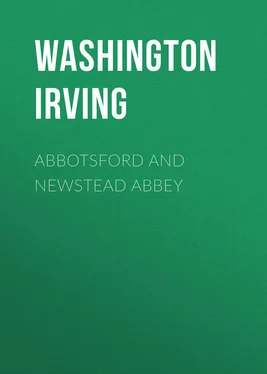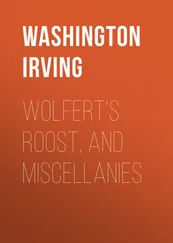Washington Irving - Abbotsford and Newstead Abbey
Здесь есть возможность читать онлайн «Washington Irving - Abbotsford and Newstead Abbey» — ознакомительный отрывок электронной книги совершенно бесплатно, а после прочтения отрывка купить полную версию. В некоторых случаях можно слушать аудио, скачать через торрент в формате fb2 и присутствует краткое содержание. Жанр: foreign_antique, foreign_prose, на английском языке. Описание произведения, (предисловие) а так же отзывы посетителей доступны на портале библиотеки ЛибКат.
- Название:Abbotsford and Newstead Abbey
- Автор:
- Жанр:
- Год:неизвестен
- ISBN:нет данных
- Рейтинг книги:3 / 5. Голосов: 1
-
Избранное:Добавить в избранное
- Отзывы:
-
Ваша оценка:
- 60
- 1
- 2
- 3
- 4
- 5
Abbotsford and Newstead Abbey: краткое содержание, описание и аннотация
Предлагаем к чтению аннотацию, описание, краткое содержание или предисловие (зависит от того, что написал сам автор книги «Abbotsford and Newstead Abbey»). Если вы не нашли необходимую информацию о книге — напишите в комментариях, мы постараемся отыскать её.
Abbotsford and Newstead Abbey — читать онлайн ознакомительный отрывок
Ниже представлен текст книги, разбитый по страницам. Система сохранения места последней прочитанной страницы, позволяет с удобством читать онлайн бесплатно книгу «Abbotsford and Newstead Abbey», без необходимости каждый раз заново искать на чём Вы остановились. Поставьте закладку, и сможете в любой момент перейти на страницу, на которой закончили чтение.
Интервал:
Закладка:
"Why, soldiers, why,
Should we be melancholy, boys?
Why, soldiers, why,
Whose business 'tis to die!
For should next campaign
Send us to him who made us, boys
We're free from pain:
But should we remain,
A bottle and kind landlady
Makes all well again."
"So," added he, "the poor lad who fell at Waterloo, in all probability, had been singing these songs in his tent the night before the battle, and thinking of the fair dame who had taught him them, and promising himself, should he outlive the campaign, to return to her all glorious from the wars."
I find since that Scott published translations of these songs among some of his smaller poems.
The evening passed away delightfully in this quaint-looking apartment, half study, half drawing-room. Scott read several passages from the old romance of "Arthur," with a fine, deep sonorous voice, and a gravity of tone that seemed to suit the antiquated, black-letter volume. It was a rich treat to hear such a work, read by such a person, and in such a place; and his appearance as he sat reading, in a large armed chair, with his favorite hound Maida at his feet, and surrounded by books and relics, and border trophies, would have formed an admirable and most characteristic picture.
While Scott was reading, the sage grimalkin, already mentioned, had taken his seat in a chair beside the fire, and remained with fixed eye and grave demeanor, as if listening to the reader. I observed to Scott that his cat seemed to have a black-letter taste in literature.
"Ah," said he, "these cats are a very mysterious kind of folk. There is always more passing in their minds than we are aware of. It comes no doubt from their being so familiar with witches and warlocks." He went on to tell a little story about a gude man who was returning to his cottage one night, when, in a lonely out-of-the-way place, he met with a funeral procession of cats all in mourning, bearing one of their race to the grave in a coffin covered with a black velvet pall. The worthy man, astonished and half-frightened at so strange a pageant, hastened home and told what he had seen to his wife and children. Scarce had he finished, when a great black cat that sat beside the fire raised himself up, exclaimed "Then I am king of the cats!" and vanished up the chimney. The funeral seen by the gude man, was one of the cat dynasty.
"Our grimalkin here," added Scott, "sometimes reminds me of the story, by the airs of sovereignty which he assumes; and I am apt to treat him with respect from the idea that he may be a great prince incog., and may some time or other come to the throne."
In this way Scott would make the habits and peculiarities of even the dumb animals about him subjects for humorous remark or whimsical story.
Our evening was enlivened also by an occasional song from Sophia Scott, at the request of her father. She never wanted to be asked twice, but complied frankly and cheerfully. Her songs were all Scotch, sung without any accompaniment, in a simple manner, but with great spirit and expression, and in their native dialects, which gave them an additional charm. It was delightful to hear her carol off in sprightly style, and with an animated air, some of those generous-spirited old Jacobite songs, once current among the adherents of the Pretender in Scotland, in which he is designated by the appellation of "The Young Chevalier."
These songs were much relished by Scott, notwithstanding his loyalty; for the unfortunate "Chevalier" has always been a hero of romance with him, as he has with many other staunch adherents to the House of Hanover, now that the Stuart line has lost all its terrors. In speaking on the subject, Scott mentioned as a curious fact, that, among the papers of the "Chevalier," which had been submitted by government to his inspection, he had found a memorial to Charles from some adherents in America, dated 1778, proposing to set up his standard in the back settlements. I regret that, at the time, I did not make more particular inquiries of Scott on the subject; the document in question, however, in all probability, still exists among the Pretender's papers, which are in the possession of the British Government. In the course of the evening, Scott related the story of a whimsical picture hanging in the room, which had been drawn for him by a lady of his acquaintance. It represented the doleful perplexity of a wealthy and handsome young English knight of the olden time, who, in the course of a border foray, had been captured and carried off to the castle of a hard-headed and high-handed old baron. The unfortunate youth was thrown into a dungeon, and a tall gallows erected before the castle gate for his execution. When all was ready, he was brought into the castle hall where the grim baron was seated in state, with his warriors armed to the teeth around him, and was given his choice, either to swing on the gibbet or to marry the baron's daughter. The last may be thought an easy alternative, but unfortunately, the baron's young lady was hideously ugly, with a mouth from ear to ear, so that not a suitor was to be had for her, either for love or money, and she was known throughout the border country by the name of Muckle-mouthed Mag!
The picture in question represented the unhappy dilemma of the handsome youth. Before him sat the grim baron, with a face worthy of the father of such a daughter, and looking daggers and ratsbane. On one side of him was Muckle-mouthed Mag, with an amorous smile across the whole breadth of her countenance, and a leer enough to turn a man to stone; on the other side was the father confessor, a sleek friar, jogging the youth's elbow, and pointing to the gallows, seen in perspective through the open portal.
The story goes, that after long laboring in mind, between the altar and the halter, the love of life prevailed, and the youth resigned himself to the charms of Muckle-mouthed Mag. Contrary to all the probabilities of romance, the match proved a happy one. The baron's daughter, if not beautiful, was a most exemplary wife; her husband was never troubled with any of those doubts and jealousies which sometimes mar the happiness of connubial life, and was made the father of a fair and undoubtedly legitimate hue, which still flourishes on the border.
I give but a faint outline of the story from vague recollection; it may, perchance, be more richly related elsewhere, by some one who may retain something of the delightful humor with which Scott recounted it.
When I retired for the night, I found it almost impossible to sleep; the idea of being under the roof of Scott; of being on the borders of the Tweed, in the very centre of that region which had for some time past been the favorite scene of romantic fiction; and above all, the recollections of the ramble I had taken, the company in which I had taken it, and the conversation which had passed, all fermented in my mind, and nearly drove sleep from my pillow.
On the following morning, the sun darted his beams from over the hills through the low lattice window. I rose at an early hour, and looked out between the branches of eglantine which overhung the casement. To my surprise Scott was already up and forth, seated on a fragment of stone, and chatting with the workmen employed on the new building. I had supposed, after the time he had wasted upon me yesterday, he would be closely occupied this morning, but he appeared like a man of leisure, who had nothing to do but bask in the sunshine and amuse himself.
I soon dressed myself and joined him. He talked about his proposed plans of Abbotsford; happy would it have been for him could he have contented himself with his delightful little vine-covered cottage, and the simple, yet hearty and hospitable style, in which he lived at the time of my visit. The great pile of Abbotsford, with the huge expense it entailed upon him, of servants, retainers, guests, and baronial style, was a drain upon his purse, a tax upon his exertions, and a weight upon his mind, that finally crushed him.
Читать дальшеИнтервал:
Закладка:
Похожие книги на «Abbotsford and Newstead Abbey»
Представляем Вашему вниманию похожие книги на «Abbotsford and Newstead Abbey» списком для выбора. Мы отобрали схожую по названию и смыслу литературу в надежде предоставить читателям больше вариантов отыскать новые, интересные, ещё непрочитанные произведения.
Обсуждение, отзывы о книге «Abbotsford and Newstead Abbey» и просто собственные мнения читателей. Оставьте ваши комментарии, напишите, что Вы думаете о произведении, его смысле или главных героях. Укажите что конкретно понравилось, а что нет, и почему Вы так считаете.












